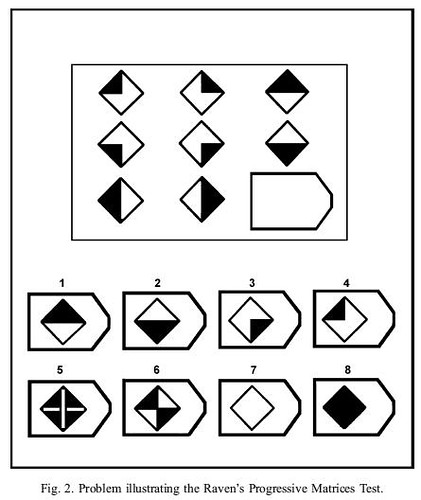 re:
re:Rising Mean IQ: Cognitive demand of mathematics education for young children, population exposure to formal schooling, and the neurobiology of the prefrontal cortex
Clancy Blair, David Gamson, Steven Thorne, David Baker
Intelligence 33 (2005) 95-106


So .... I think I'll carry on being an IQ skeptic for a bit longer here. (pdf file)
Not a skeptic.
No.
I'm not an IQ skeptic.
I am an IQ libertarian.
I'm going to carry on being an IQ libertarian for the foreseeable future.
practice practice practice
The irony of the Blair paper, if Blair & c's hypothesis is found to be true, is that while constructivist math textbooks eschew practice (eschew! ten-dollar word, eschew!) they may inadvertently have provided schoolchildren with distributed practice in the skills required to score well on IQ tests, in particular IQ tests such as the Raven's Progressive Matrices that measure fluid intelligence.
in a nutshell
- IQ has been rising for 100 years. No one knows why.
- Interestingly, the main rise in IQ is not in crystallized intelligence ("education, experience, and acculturation"), but in fluid intelligence ("reasoning ability applied in novel contexts" Blair, et al)
- "Gains on measures of fluid intelligence have been approximately double those on measures of crystallized abilities, with reported fluid gains in a population based sample in the Netherlands of 18–20 points in a single generation."
- The first 50 years of rise in IQ corresponds directly to the period in which mass education was being established. School raises IQ; it makes sense that the IQ of entire populations would rise as universal education was established.
- "Substantial evidence of the effects of school attendance on the development of IQ has existed for some time. A detailed review of over 50 studies using naturalistic observation, post-hoc statistical comparisons, and cohort-sequential analysis concludes that there is an association between enhancement of cognitive skills related to IQ and schooling (Ceci, 1991). These studies, conducted throughout the 20th century, comparing schooled and non-schooled populations, have estimated that the enhancement of IQ by schooling ranges from 0.3 to 0.6 of an IQ point for every year of school competed. Importantly, the association between IQ and exposure to formal education is not only due to children with higher measured IQ staying in school longer." (Blair et al)
- So the increase in education up until mid-twentieth century may account for the increase in IQ to that point. But what accounts for the continued increase after everyone was going to school?
- Fuzzy math! "At the turn of the 20th century, much of the mathematics instruction for children in the upper elementary grades was rigid, formalistic, and emphasized drill and rote memorization. For example, one educator who visited 36 urban school systems in the 1890s characterized mathematics instruction as patently absurd: bIn no single exercise is a child permitted to think,Q he exclaimed. He is told just what to say, and he is drilled not only in what to say, but also in the manner in which he must say it. (Rice,
1893, 38)."
- "The 1950s and 1960s witnessed further significant changes in the way mathematics education was conceptualized. Nationally, mathematics instruction shifted away from a focus on algorithms and basic arithmetic problems (i.e., pages and pages of simple equations) and instead emphasized problems for young students in visual-spatial relations and the holding in mind of multiple operations in problem solving. Such problem types emphasize pattern recognition and patterncompletion (see Panel 4C)."
- "By the early 1990s, much of the basic conceptual work of geometry was delivered to children in kindergarten, first, and second grade (Panel 5d). Currently, young children regularly engage in visual-spatial problem solving associated with prefrontally based working memory functions that their grandparentsT generation would not have been exposed to until the seventh or eighth grade and that their great-grandparents’ generation may not have been introduced to at all."
- The movement of geometry problems similar to items on the Raven's Progressive Matrices into K-5 fits the most salient facts of the situation: it coincides with the period in question (roughly 1950 - the present) and it would affect children whose frontal lobes are developing - i.e. these books are an environmental influence on a developing brain.
the bad news
Unfortunately, rising IQ scores have not led to rising math scores.
Functional implications of these gains for real world competence, however, remain unclear, particularly given the paradoxical finding that increasing fluid cognitive demand of early elementary math education has not led to substantial increased math achievement over time.
dang!
the IQ paradox
I keep threatening to write a post about the "IQ paradox," and now I've done it.
The IQ paradox is a contradiction between two findings:
- twin studies show IQ to be highly heritable
- the Flynn effect shows IQ has been rising steadily for 100 years, too quickly to be accounted for by genetic changes, in theory. (I say "in theory" for reasons relating to Temple Grandin's research; won't go into it here. Suffice it to say that large gene-based behavioral changes can happen very quickly in animal populations.)
This summary of Flynn's and Dickens' famous paper attempting to resolve the paradox is worth reading:
Darwin's Origin of Species sparked the modern debate about genes versus environment in explaining differences between human individuals and groups. Ever since, the pendulum of scientific opinion has swung back and forth with consensus always out of reach. For the last 15 years, psychologists have been plagued by a paradox that suggests that environment is both feeble and overwhelmingly potent.
The paradox emerged from a debate about race. US whites outscore US blacks on IQ tests by 15 points. Does that gap have environmental causes or is it partially due to genes? In 1973, Arthur Jensen constructed a model that applied kinship data to group differences in IQ. Evidence from kinship studies showed identical twins separated at birth and raised in different homes grow up with very similar IQs. The fact that they have identical genes provides an obvious explanation. Jensen argued that fully 75 percent of IQ variance between individuals was due to genetic differences (a value which sits in the middle of the range recently endorsed by a select committee of the American Psychological Association for adult IQ). Jensen's model showed that a purely environmental explanation of the black/white IQ gap meant that the environment of the average US black must be as unfavorable for the development of IQ as the lowest one percent of white environments measured in terms of their effects on IQ. That simply did not seem possible.
Jensen's model seemed to preclude a purely environmental explanation for any large IQ gap between groups. Then, in 1987, Flynn showed that in nation after nation, the current generation outscores the last generation by some 9 to 20 IQ points. The gains are greatest on those tests often called the best measures of intelligence. Their size and speed dictate an environmental explanation. Flynn applied Jensen's model. An environmental explanation meant putting the current generation within the top one-tenth of one percent of the last generation in terms of environmental quality. What was known to be true was shown to be impossible.
The basic argument of Flynn - Dickens, iirc (I haven't taken the time to read the paper again) is that the environment has a strong effect on IQ but the environment to which a person is exposed is heavily determined by his genes.
In other words, your genes don't give you your IQ. Your genes give you the environment that's going to give you your IQ. (I think that's right. If someone who actually does this research happens by and wishes to fact-check, I'll correct.)
A person with a high IQ has been given a hunger for the kind of environmental stimulation that will raise his IQ.
My sense of this is that Flynn Dickens have pushed the effect of genes back a step, to something like "drive" or "desire."
At least, that's what I take away from Robert Plomin (subscription required):
Robert Plomin of the Institute of Psychiatry in London stands at the forefront of such research. "g shows significant genetic influence," he says. Plomin points to dozens of twin and adoption studies indicating that genes contribute substantially to individual differences in g.
Such studies find that genetic influences on g are modest among infants and children but become progressively stronger throughout adulthood. This suggests that, as people grow older, they find and create environments congenial to promoting their own genetic strengths, Plomin theorizes. "It may be more appropriate to think about g [general intelligence] as an appetite rather than an aptitude," he says.
This means that twin studies finding high heritability for IQ may have "masked" the effects of the environment.
Genes determine the environment, not the IQ.
...the assumption of large environmentally driven gains in intelligence can be reconciled with the assumption of high heritability for intelligence. This is because the occurrence of gene-environment correlation resulting from reciprocal causation between phenotypic IQ and environment can mask the potency of the effect of the environment on intelligence. [Blair, et al]
In other words, studies finding .75 hereditability for IQ are actually finding .75 hereditability for environment.
math books could do it
If it's correct to see g as an appetite instead of an aptitude, this means that a widespread change in math texbooks could indeed produce a rise in IQ.
Entire generations are exposed to these books via compulsory education, which takes appetite out of the equation. Kids don't need a genetic hunger for IQ-raising lessons in visual reasoning; they're going to be doing these lessons whether they want to or not.
If the geometry-in-Kindergarten mechanism proves to be correct, then having Kindergarten children do geometry problems would be the IQ-raising equivalent of putting Vitamin D in milk and folic acid in bread.
You're not leaving it to people's natural gene-driven appetites to get smarter or to eat enough folic acid to prevent spina bifida. The government makes those choices for you.
And.... it makes sense that a math-book-driven rise in IQ wouldn't result in a rise in math achievement. IQ and achievement are two different things. Achievement -- expertise -- comes from expert instruction combined with deliberate practice. (pdf file)
A rise in IQ ought to make it easier to learn math.
It doesn't guarantee that anyone will actually do so.
update 3-25-2007
The distinction between fluid and crystallized intelligence is probably wrong.
good schools raise IQ, bad schools lower IQ, part 1
good schools raise IQ, bad schools lower IQ, part 2
good schools raise IQ, bad schools lower IQ, part 3
Seth Roberts on IQ
fuzzy math makes you smarter
IQ quiz
school raises IQ
intelligence is verbal, perceptual, and image rotation
math isn't English
The Cambridge Handbook of Expertise and Expert Performance





No comments:
Post a Comment